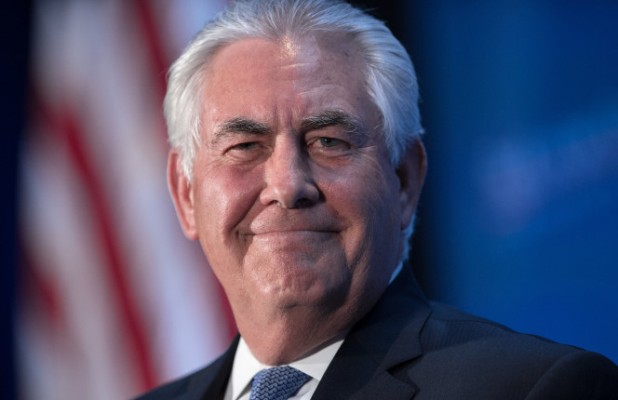Sudan and the U.S. face similar challenges: FM

February 4, 2017 (KHARTOUM) – Sudan and the United States are facing similar challenges, said Foreign Minister Ibrahim Ghandour in a congratulations message to his American counterpart Rex Tillerson, for his confirmation by the Senate on Saturday.
Last Wednesday, the U.S. Senate easily confirmed Tillerson as President Donald Trump’s secretary of state, as the Republicans hold a majority of 52 seats in the 100-member upper chamber.
In a press release extended to Sudan Tribune Saturday, Foreign Ministry Spokesperson Gharib Allah Khidir, said Ghandour sent a message to Tillerson, congratulating him for his appointment as secretary of state and wishing him success in his duties.
According to statement by the foreign ministry spokesperson Gharib Allah Khidir, in his letter Ghandour pointed to the agreement recently reached by the two countries on the five-track engagement, saying “Sudan and the U.S. share a number of values and objectives and face the same challenges”.
On 13 January, U.S. President Barack Obama signed an executive order to ease sanctions against Sudan enabling trade and investment transactions to resume with the east African nation.
The decision came after the two sides discussed five tracks including the fight against terrorism, Uganda’s Lord’s Resistance Army (LRA), Sudan’s role in the peace process in South Sudan, Sudan’s peace and the humanitarian situation in South Kordofan and Blue Nile.
“The success of that plan has led to the lift of economic sanctions on Sudan,” said Ghandour
The Sudanese top diplomat stressed his country’s strict adherence to enhance bilateral ties between the two countries, saying he looks forward to working with Tillerson to promote coordination on regional and international issues of common concern.
It is noteworthy that the lifting of sanctions would be delayed by 180 days, however. The delay is seen as a way of further encouraging the Sudanese government to continue its anti-terror fight -and to improve its record on human rights.
The six month delay means that by July 12, U.S. government agencies will confirm to the White House that Sudan has continued to be cooperative on both fronts.
PROMOTING BILATERAL RELATIONS
Meanwhile, Sudan’s Vice-President Hasabo Mohamed Abdel-Rahman Saturday said his country seeks to promote relations with the U.S. during the coming six months.
Abdel-Rahman, who addressed a conference of the ruling National Conference Party (NCP) Saturday, said Sudan’s foreign relations is based on principles of mutual interests, non-interference in the affairs of other nations and rejection of extremism and terrorism.
In the same context, foreign ministry under-secretary Abdel-Ghani al-Nai’m renewed his country’s demand for the U.S. to lift Sudan’s name from the list of states sponsors of terrorism, stressing Khartoum’s cooperation with Washington on the various fields.
He told the semi-government Sudan Media Center (SMC) that Sudan is closely cooperating with the U.S. on the fight against terrorism, saying senior U.S. officials have acknowledged this cooperation.
Al-Nai’m further underscored Sudan’s keenness to continue cooperation with the new U.S. Administration on combating terrorism as well as on economic, cultural and investment domains.
The U.S. State Department added Sudan to its state terror list in 1993, accusing Khartoum of harbouring local and international militants including for a time AQ leader Osama bin Laden.
Since Washington admitted Sudan’s cooperation in the anti-terror war but continues to maintain the east African nation name on the list.
Last September, the State Department spokesperson praised Sudan counterterrorism cooperation with the United States.
“In recent months, Sudan has taken important steps to counter ISIL and other terrorist groups and has sought to prevent their movement into and through Sudan,” said John Kirby.
Countries on the list of state sponsors of terrorism cannot receive U.S. economic aid or buy U.S. weapons and a raft of restrictions on financial and other dealings. The list currently includes Sudan, Libya, Iran, Iraq, North Korea, Syria and Yemen.
(ST)
